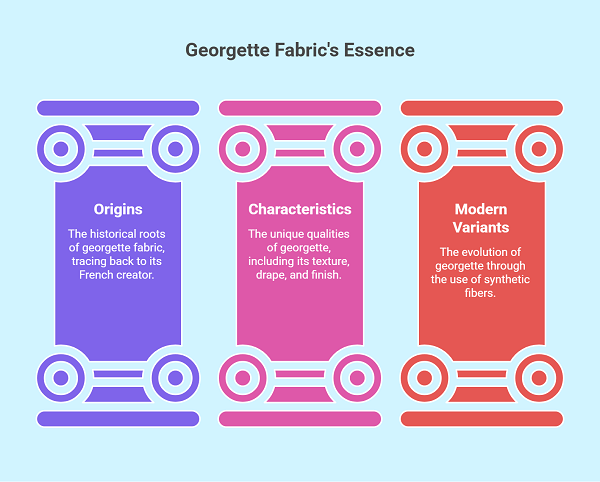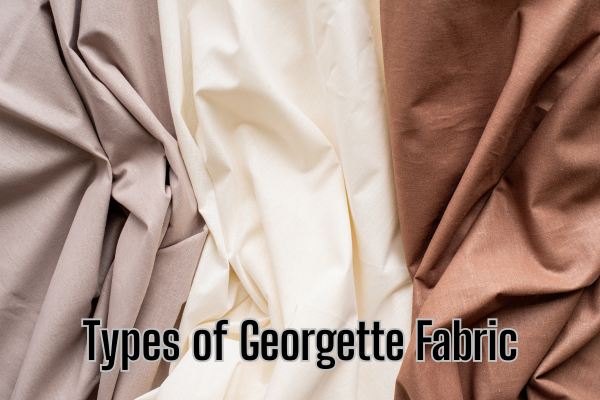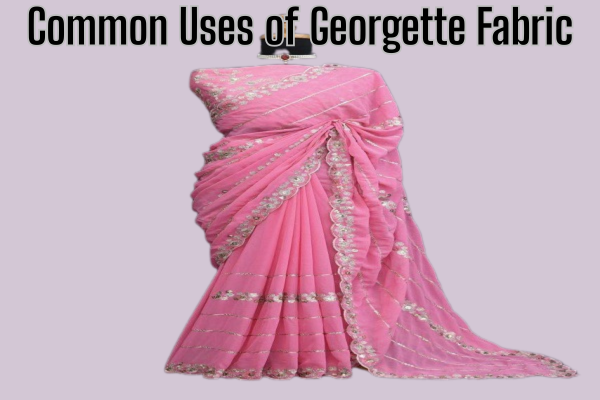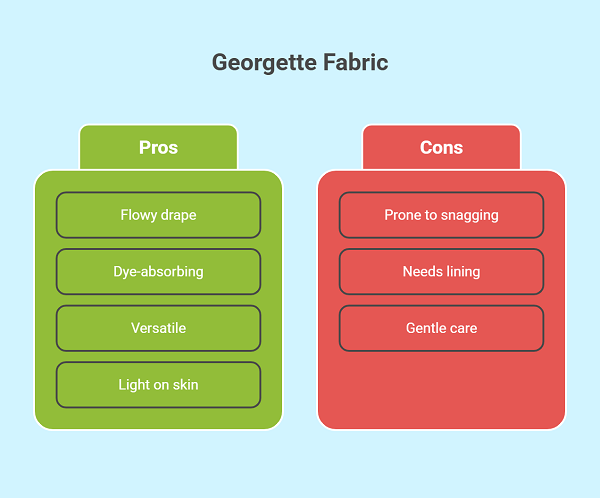What is Georgette Fabric?
Ever worn something that felt as light as air but looked like a million bucks? Chances are, you were rocking georgette fabric. This sheer, soft, and flowy textile is a darling of the fashion world—and not just because it sounds fancy.
Table of Contents
Georgette fabric is a lightweight, crêpe-style textile made from silk or synthetic fibers. It’s known for its grainy texture, delicate drape, and matte finish. Though soft, it has just enough stiffness to hold shape—perfect for garments that flirt with the wind.
The Origins and Evolution of Georgette

Where it all began
Back in the early 20th century, a French dressmaker named Georgette de la Plante created this iconic fabric. It first hit the runways (and sewing rooms) around the 1910s. Yes, it’s over a century old—like the Rolls-Royce of fabrics, just easier to wear.
Modern-day manufacturing
Originally, georgette fabric was made from 100% silk. But thanks to modern advancements, it now also comes in polyester, viscose, and nylon variants. The synthetic versions mimic the silk’s crinkled finish but are often cheaper and more durable.
Georgette Fabric Properties
Let’s talk numbers and facts—because feeling is believing, but data doesn’t lie.
Texture and feel
Georgette’s distinctive crêpe texture is achieved through tightly twisted yarns woven in alternating S- and Z-twist patterns. This creates a slightly rough surface that’s surprisingly soft. It weighs around 30–40 GSM, depending on the type.
Breathability and flow
While silk georgette ranks high in breathability, synthetic blends may not be as airy. However, all versions boast a graceful, fluttery drape that’s practically poetry in motion.
Sheerness and structure
Georgette fabric is semi-sheer—light passes through but you won’t be completely on display. Its structure allows for layers, pleats, and frills without bulking up.
Types of Georgette Fabric

There’s more than one flavor of georgette. And no, they’re not all created equal.
Pure silk georgette
The OG. Luxurious, breathable, and biodegradable. It’s pricey, but oh-so-worth-it. Expect to pay $30–$60 per yard.
Polyester georgette
The budget-friendly twin. Less breathable, more wrinkle-resistant. Priced between $5–$15 per yard.
Jacquard georgette
Think patterns woven directly into the fabric. Ideal for statement pieces and elevated formal wear.
Satin georgette
A silky blend of gloss and texture. Perfect for party dresses, sarees, and evening gowns.
Common Uses of Georgette Fabric

Why is georgette fabric everywhere? Because it’s both fabulous and functional.
Fashion industry
From sarees to skirts, kimonos to kaftans, georgette is a designer’s best friend. It layers well, holds dye beautifully, and adds volume without bulk.
Interior design
Yes, georgette also flirts with furniture. Think breezy curtains, romantic canopies, and dreamy drapes.
Bridal wear and couture
For wedding gowns, overlays, and veils, georgette brings soft glam without the drama. Designers love its balance between flow and firmness.
Pros and Cons of Georgette Fabric

Why designers love it
- Flowy drape: Makes even a basic dress look red carpet-ready
- Dye-absorbing: Rich, saturated colors with minimal effort
- Versatile: Great for both Eastern and Western styles
- Light on skin: Doesn’t weigh you down
Where it struggles
- Prone to snagging: Avoid sharp jewelry
- Needs lining: It’s sheer, not scandalous
- Requires gentle care: Not your toss-in-the-wash kind of fabric
Care and Maintenance
Washing instructions
Silk georgette? Hand-wash only. Use cold water and mild detergent. Polyester georgette can handle a delicate cycle but avoid fabric softeners.
Ironing and storage
Low heat is your friend. Always iron on the reverse side, preferably with a cloth between the fabric and the iron. Fold it neatly—don’t hang it, or gravity will mess with its shape.
Final Thoughts on Georgette Fabric
Georgette fabric isn’t just a material—it’s a mood. Romantic, elegant, and effortless. Whether you’re crafting a sari or a spring gown, georgette helps you bring grace to the game.
But let’s be honest: while it’s a dream to wear, it’s not always a breeze to care for. Still, if you want texture without bulk, class without weight, and movement without mess, georgette’s got your back.
FAQs on Georgette Fabric
1. Is Georgette fabric suitable for summer?
Yes, especially silk georgette. It’s breathable and light, perfect for warm weather.
2. Does Georgette wrinkle easily?
Silk georgette may wrinkle, but polyester georgette is more resistant. Use low heat when ironing.
3. Can I dye georgette at home?
Yes. It absorbs dye beautifully. Just use the correct dye type for the fabric (acid dyes for silk, disperse dyes for polyester).
4. What’s the difference between chiffon and georgette fabric?
Chiffon is smoother and more sheer, while georgette is crinkled and more structured.
5. Is Georgette fabric eco-friendly?
Silk georgette is biodegradable, but polyester georgette is synthetic. Choose based on your sustainability goals.
